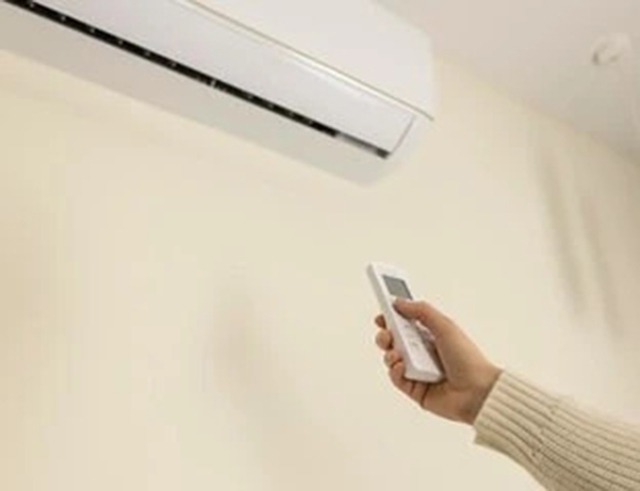Sleeping with the air conditioner on can make you feel more comfortable on hot nights, but turning it up too cold can be risky for some people.
People with respiratory diseases
Sleeping in an air-conditioned room with a temperature that is too cold can lead to respiratory problems, especially for people who are sensitive to cold air or have respiratory diseases like asthma or allergies, according to the Times of India.
Cold air from air conditioners can irritate the respiratory tract, causing symptoms such as coughing, wheezing, chest tightness and difficulty breathing.

Sleeping with the air conditioning on can help you feel more comfortable on hot nights, but turning it up too cold can be risky for some people.
Pexels
Dry air can cause the mucous membranes in your throat and airways to dry out and become irritated, says Dr. Haleema Yezdani, a general practitioner based in Bangalore, India. Prolonged exposure to dry air while sleeping can also irritate your throat and cause hoarseness, according to Happiest Health.
Prolonged exposure to cold temperatures can also constrict blood vessels in the nasal passages and upper respiratory tract, reducing the ability to fight off pathogens and viruses.
To minimize respiratory problems, consider setting your air conditioner to a moderate temperature, using a humidifier, and regularly cleaning or replacing air filters to reduce allergens and pollutants.
People with bone and joint pain
Sleeping in an air-conditioned room that is too cold can cause muscle stiffness and joint pain, especially if exposed to cold temperatures for long periods of time. Cold temperatures can cause muscles to contract and tighten, leading to stiffness and pain.
Additionally, cold air can aggravate joint pain and stiffness in people with arthritis or musculoskeletal conditions, according to the Times of India.

Cold air can aggravate joint pain and stiffness in people with arthritis or musculoskeletal conditions.
Pexels
To prevent muscle stiffness and joint pain, keep your air conditioning temperature moderate, use blankets to keep warm while sleeping, and do gentle stretching exercises before bed to help relax and stay flexible.
People with insomnia
Sleeping in a room that is too cold can disrupt sleep and lead to poor sleep quality. Cold temperatures can cause discomfort and awakenings, while noise can disrupt sleep and prevent deep, restorative sleep.
To sleep well, set the temperature at a comfortable level, use earplugs to block out noise, and maintain a regular sleep schedule.
Newborn
Dr. Vidya Vimal, senior consultant pediatrician, SP Medifort Hospital (India), said that for newborns, it is necessary to adjust the air conditioner temperature to match the body temperature.
The air conditioner should be turned on at least 20 minutes before letting the child enter the room and the temperature should be maintained at 25 - 27°C, according to Happiest Health .
Do not expose children directly to cold air to avoid coughing, which can lead to pneumonia. Some infants and young children may also be allergic to cold, so do not turn on the air conditioner too cold.
Dr. Yezdani recommends that for healthy people, the temperature between 20 - 25°C is optimal for sleeping. It is recommended to limit the use of air conditioning while sleeping for about 1 - 2 hours.
Source: https://thanhnien.vn/nhung-ai-khong-nen-bat-may-dieu-hoa-qua-lanh-khi-ngu-185240426134722651.htm






































































































Comment (0)